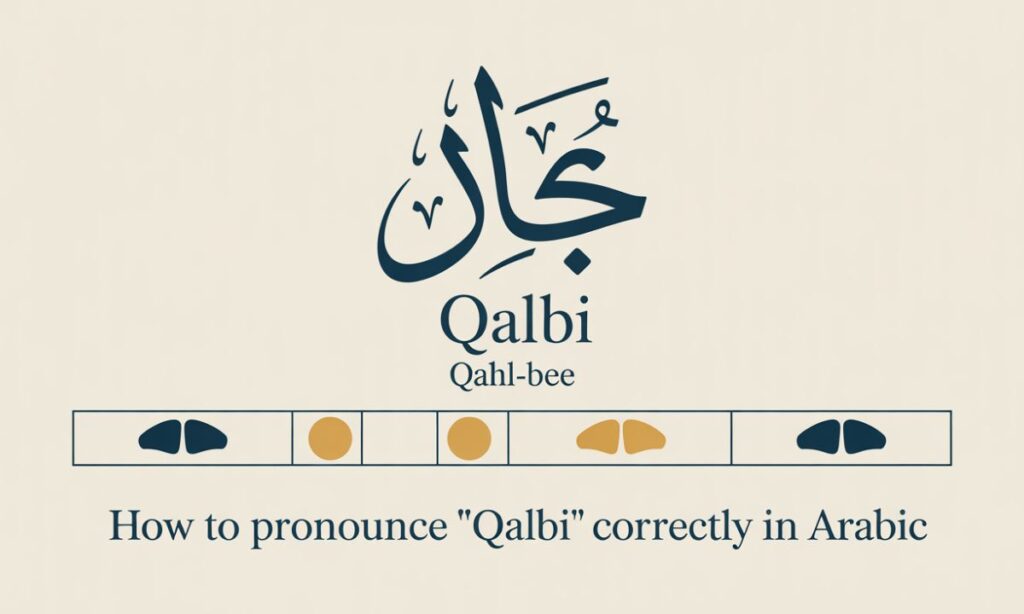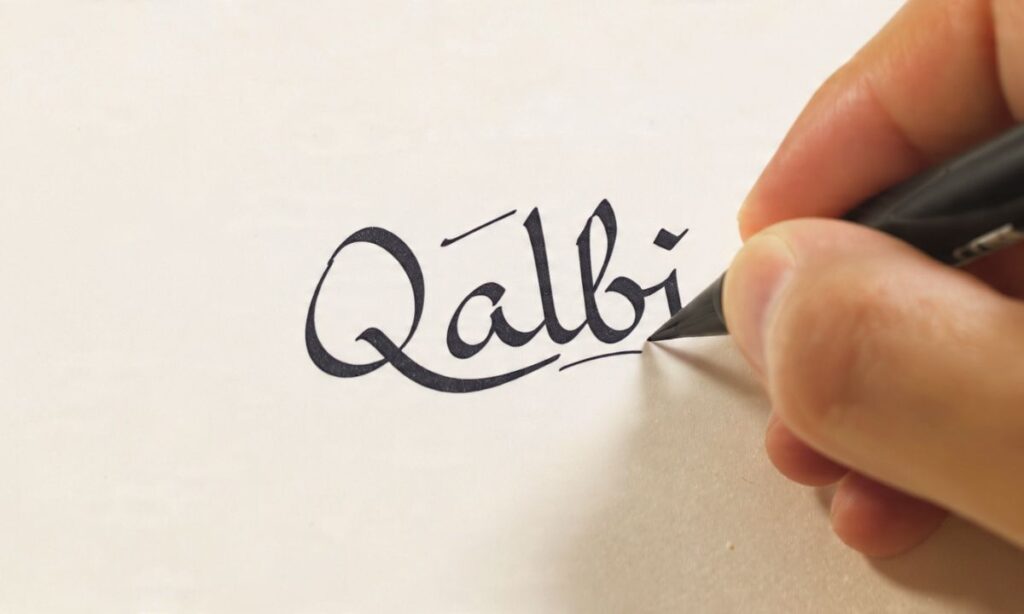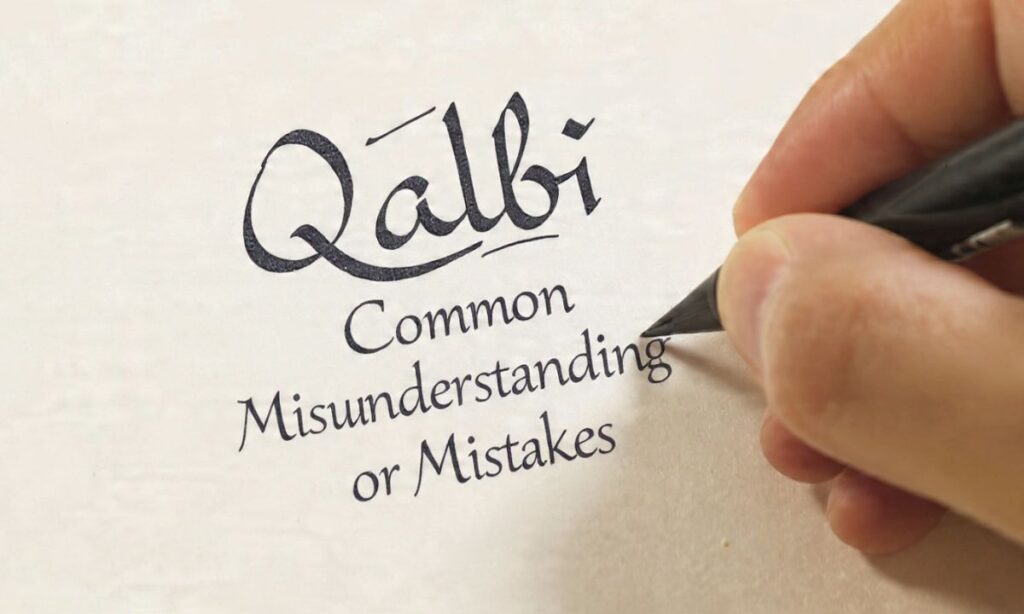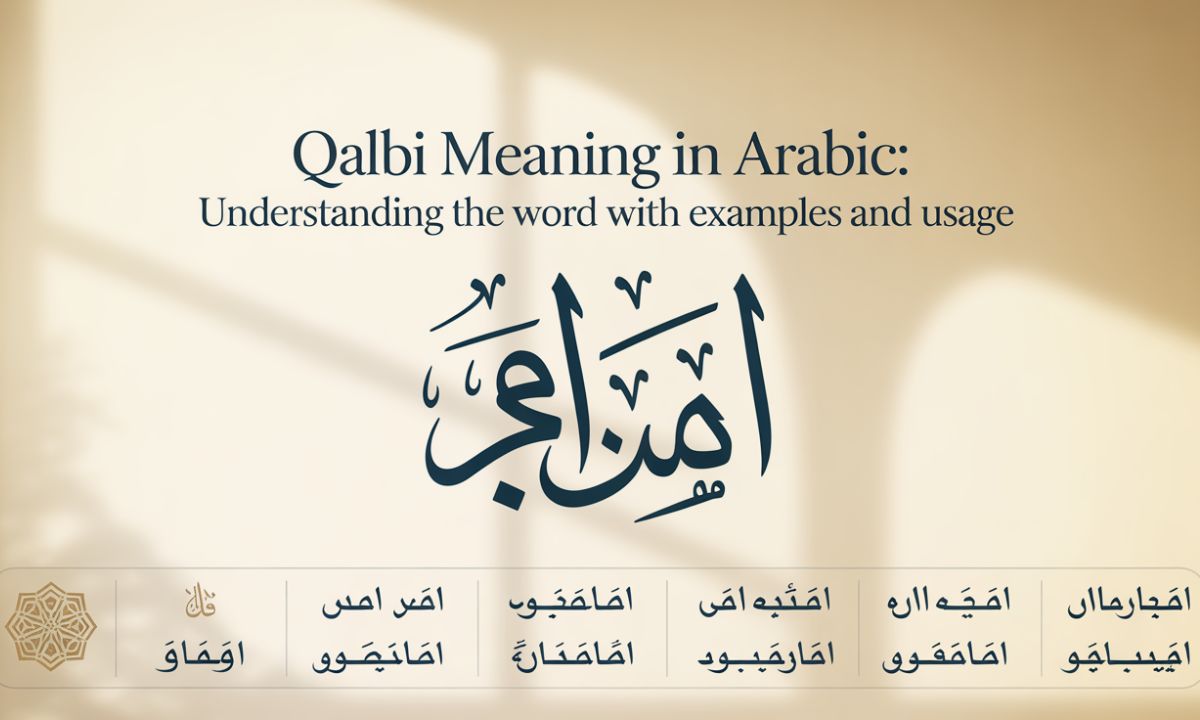The qalbi meaning in Arabic connects deeply with emotions. It represents the heart in its most personal form. This word appears frequently in Arabic conversations and literature. Understanding it opens doors to authentic Arabic expression.
Learning the qalbi meaning in Arabic enriches your vocabulary significantly. The word carries cultural weight beyond simple translation. It conveys emotions that English words cannot fully express. Arabic speakers use it daily in various contexts.
This guide explores qalbi from multiple authentic perspectives. You will learn pronunciation, grammar, and cultural usage properly. We include Quranic references and real conversation examples throughout. By the end, you’ll use this word confidently.
Qalbi Meaning in Arabic
The word qalbi translates directly to “my heart” always. It comes from the root word qalb originally. The possessive suffix makes it deeply personal in nature. This simple addition transforms meaning from general to intimate.
In Arabic, qalbi meaning in Arabic shows true possession. The word indicates something belonging exclusively to you. It’s not just anatomical but emotional and spiritual too. Arab people use it to express their innermost feelings naturally.
The term appears in formal and informal speech equally. You’ll hear it in poetry, songs, and daily talk. Understanding this word helps decode Arabic emotional expression fully. It’s essential for anyone learning the Arabic language seriously.
How to Pronounce “Qalbi” Correctly in Arabic

Pronouncing qalbi correctly requires attention to specific Arabic sounds. The “q” sound comes from deep in the throat, distinctly. The “l” is clear and the “b” soft. The final “i” extends slightly with gentle emphasis.
Pronunciation Tips:
- Start with a deep guttural “q” sound
- Keep the “al” flowing smoothly together naturally
- End with a soft “bee” sound clearly
- Avoid making it sound like “kalbi” incorrectly
Linguistic Root and Grammatical Usage
The root q-l-b forms the foundation entirely here. This three-letter root means heart, center, or core. Arabic builds many related words from this pattern. Understanding roots helps you recognize related vocabulary easily.
Grammatically, qalbi uses the first-person possessive suffix. The “i” at the end indicates “my” specifically. Arabic adds different suffixes for other possessive forms. This system makes Arabic both precise and beautiful.
The word functions as a noun in sentence structure. You can use it as subject or an object freely. It combines with verbs, adjectives, and prepositions naturally. Mastering this usage improves your Arabic fluency dramatically.
| Form | Arabic | Transliteration | Meaning | Usage Type |
| Root | قَلْب | Qalb | Heart | Singular noun |
| Possessive | قَلْبِي | Qalbi | My heart | First person singular |
| Your heart (m) | قَلْبُكَ | Qalbuka | Your heart | Second person masculine |
| Your heart (f) | قَلْبُكِ | Qalbuki | Your heart | Second person feminine |
| His heart | قَلْبُهُ | Qalbuhu | His heart | Third person masculine |
| Her heart | قَلْبُهَا | Qalbuha | Her heart | Third person feminine |
| Plural | قُلُوب | Quloob | Hearts | Plural form |
Examples of “Qalbi” in Arabic Sentences
Arabic: قَلْبِي مَعَكَ دَائِمًا
Transliteration: Qalbi ma’aka da’iman
Translation: My heart is always with you
Meaning: This expresses emotional connection and constant presence lovingly.
Arabic: يا قَلْبِي، لَا تَحْزَنْ أَبَدًا
Transliteration: Ya qalbi, la tahzan abadan
Translation: Oh my heart, never be sad
Meaning: A comforting phrase speaking to one’s own heart.
Arabic: قَلْبِي يَنْبِضُ بِحُبِّكَ
Transliteration: Qalbi yanbidu bi hubbika
Translation: My heart beats with your love
Meaning: Romantic expression showing deep affection and devotion.
Arabic: قَلْبِي مُمْتَلِئٌ بِالسَّعَادَةِ
Transliteration: Qalbi mumtali’ bil sa’adah
Translation: My heart is filled with happiness
Meaning: Expressing complete joy and contentment from within.
Arabic: اللَّهُمَّ طَهِّرْ قَلْبِي
Transliteration: Allahumma tahhir qalbi
Translation: O Allah, purify my heart
Meaning: A common supplication asking for spiritual cleansing.
Arabic: قَلْبِي يَشْتَاقُ إِلَيْكَ
Transliteration: Qalbi yashtaqu ilayka
Translation: My heart longs for you
Meaning: Expressing deep yearning and missing someone special.
Arabic: فِي قَلْبِي مَكَانٌ لَكَ فَقَطْ
Transliteration: Fi qalbi makanun laka faqat
Translation: In my heart, there’s a place only for you
Meaning: Showing exclusive love and special emotional attachment.
Common Expressions and Phrases Using “Qalbi”
The phrase ya qalbi meaning carries tender emotional weight. Arab people use it as an endearment term frequently. It expresses care, concern, or affection toward someone. This expression appears in songs and poetry abundantly.
Another popular phrase is habibi qalbi meaning beloved one. It combines two terms of endearment beautifully together. Anta qalbi meaning you are my heart, shows devotion. These expressions reveal how Arabic intertwines emotion with language.
Common Expressions:
- Ya qalbi (يا قلبي) – Oh my heart, term of endearment
- Habib qalbi (حبيب قلبي) – Beloved of my heart
- Anta qalbi (أنت قلبي) – You are my heart
- Fi qalbi (في قلبي) – In my heart
- Min qalbi (من قلبي) – From my heart sincerely
- Noor qalbi (نور قلبي) – Light of my heart
Cultural or Quranic Significance of “Qalbi”

The word qalb appears throughout the Quran. It represents the spiritual center of human consciousness. Allah speaks directly about hearts in numerous verses. Understanding the qalbi meaning in Arabic deepens Quranic comprehension significantly.
Key Quranic Contexts:
- The heart is the seat of understanding and faith
- Hearts that are sealed, hardened, or purified spiritually
Islamic teachings emphasize purifying the heart always and constantly. The concept of qalbi connects to taqwa piety. Believers make dua asking Allah to soften hearts. This shows how qalbi transcends mere physical meaning.
In Arabic culture, the heart symbolizes sincerity completely. When someone speaks min qalbi from their heart, truly. It means their words carry genuine truth and honesty. This cultural understanding makes qalbi deeply meaningful contextually.
Emotional and Romantic Uses of “Qalbi” in Arabic Culture
Arab people express romance through heart-centered language naturally and beautifully. Saying anta qalbi, you are my heart, conveys devotion. This phrase appears in love songs and poetry. It shows how deeply emotion connects to language.
Romantic Expressions:
- Habibi qalbi (حبيبي قلبي) – My beloved, my heart
- Anta fi qalbi (أنت في قلبي) – You are in my heart
- Hayat qalbi (حياة قلبي) – Life of my heart
- Rooh qalbi (روح قلبي) – Soul of my heart
- Ya habib al qalbi (يا حبيب القلب) – O beloved of the heart
Modern Arabic songs frequently use qalbi in lyrics. The word creates emotional resonance with listeners immediately. Understanding these expressions helps appreciate Arabic music fully. It connects language learners to authentic cultural experiences.
Common Misunderstandings or Mistakes

Many learners confuse qalb with qalbi pronunciation and meaning. The difference lies in the possessive suffix. Without proper understanding, communication becomes unclear or awkward. This distinction matters greatly in Arabic conversations.
Another mistake involves using qalbi in the wrong contexts. Some learners apply it too formally or too casually. Understanding appropriate situations prevents embarrassing errors significantly. Cultural context determines when qalbi sounds natural or forced.
| Mistake | Wrong Usage | Correct Usage | Explanation |
| Missing possession | Using qalb when meaning “my heart” | Use qalbi for personal reference | The suffix “i” is essential for possession |
| Dialect confusion | Using alby in formal writing | Use qalbi in formal contexts | Alby is colloquial, qalbi is standard |
| Gender confusion | Using the wrong suffix with qalbi | Match the suffix to the speaker gender | Arabic requires grammatical gender agreement |
| Pronunciation error | Saying “kalbi” instead of “qalbi” | Use the deep throat “q” sound | The “q” is guttural, not “k” |
| Context misuse | Using ya qalbi with strangers | Reserve for close relationships | This expression is intimate and personal |
| Plural mistake | Using qalbi for multiple hearts | Use quloob for plural hearts | Qalbi is singular possessive only |
Why You Should Learn “Qalbi”
Learning the qalbi meaning in Arabic enhances emotional expression tremendously. You can communicate feelings more authentically in conversations. This word appears constantly in the media and literature. Knowing it makes Arabic content more accessible naturally.
Understanding qalbi improves Quranic comprehension significantly and deeply. Many verses reference the heart’s spiritual state directly. This knowledge enriches your Islamic studies considerably overall. It connects language learning with spiritual growth beautifully.
The word appears in everyday Arabic conversations frequently. From casual greetings to deep discussions are constantly present. Mastering qalbi makes you sound more native-like fluent. It shows cultural awareness and linguistic competence simultaneously.
Last Words
The qalbi meaning in Arabic extends beyond simple translation. It encompasses emotion, spirituality, and cultural identity together. This word opens windows into the Arabic worldview authentically. Learning it enriches your language journey immeasurably forever.
Understanding qalbi connects you to millions of speakers. It helps you express feelings with a genuine Arabic flavor. From Quranic study to daily conversation naturally flows. This word truly represents the heart of Arabic.
Keep practicing qalbi in different contexts regularly and consistently. Listen to Arabic songs and read poetry carefully. Notice how native speakers use this word naturally. Your fluency will grow with authentic emotional expression.
Frequently Asked Questions
What does qalbi mean in Arabic?
Qalbi means “my heart” in Arabic and comes from the root word qalb with a possessive suffix.
How do you pronounce qalbi correctly?
Pronounce it as “qal-bee” with a deep guttural “q” sound from the throat and a clear “l” followed by “bee.”
What is the difference between qalb and qalbi?
Qalb means “heart” in general while qalbi means “my heart” specifically with the possessive suffix “i.”
What does ya qalbi mean in Arabic?
Ya qalbi meaning “oh my heart” serves as a term of endearment used between loved ones.
What is qalbi fil madina mean?
Qalbi fil madina meaning translates to “my heart is in Medina” expressing love for the Prophet’s city.
How is qalbi used in romantic contexts?
Arab men use qalbi romantically by saying phrases like “anta qalbi” meaning “you are my heart” to express deep love.
Does qalbi appear in the Quran?
The root word qalb appears extensively in the Quran referring to the spiritual and emotional heart center.
What does habibi qalbi mean?
Habibi qalbi meaning combines “my beloved” with “my heart” creating an intensely affectionate expression.
What is the plural of qalbi?
The plural form is quloob (قُلُوب) meaning “hearts” while qalbi remains singular possessive.
What does anta qalbi mean in English?
Anta qalbi meaning in English is “you are my heart” expressing that someone is everything to you.
What does inta qalbi mean?
Inta qalbi meaning is “you are my heart” is similar to anta qalbi, expressing deep love.

David is a naming expert with 2 years of experience at NamesSelections.com, specializing in name meanings, team names, baby names, and unique name ideas. His insights guide readers to choose meaningful and powerful names for every occasion.

